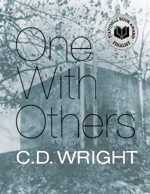 Each day leading up to the March 10 announcement of the 2010 NBCC award winners, Critical Mass highlights one of the thirty-one finalists (to read other entries in the series, click here). Today, NBCC board member Craig Morgan Teicher discusses poetry finalist C.D. Wright's One with Others (Copper Canyon Press).
Each day leading up to the March 10 announcement of the 2010 NBCC award winners, Critical Mass highlights one of the thirty-one finalists (to read other entries in the series, click here). Today, NBCC board member Craig Morgan Teicher discusses poetry finalist C.D. Wright's One with Others (Copper Canyon Press).
C.D. Wright’s One with Others is a crucial book, and not just in the way that we often say the work of a major poet is “important,” like because it stirs up some of the old dust in the isolated room of poetry, maybe cleans things up enough to let some light peek in through a window. No, it’s not just that. With this book, an account, equal parts poetry and journalism, of a charged moment in the Civil Rights Movement in the Deep South, Wright kicks down a wall that it turns out divided poetry from nonfiction. She’s developed a new form, if not a new genre, that allows for a new blending of fact and feeling, one which could help us tell our stories going forward, if only we’ll let it school us.
Of course, the importance of this book is likely to be mostly ignored, at least as far as its implications beyond the sidelined world of poetry publishing, simply because it’s been published as a book of poetry, meaning it probably won’t be read by journalists looking for a new way to report the facts (albeit at a bit of a slant) or memoirists who are struggling to say the unsayable parts of their stories.
So here’s the story of One with Others (though like any true story, it’s not as simple as one thing happening after another): set in the thick of the Civil Rights Movement in Wright’s home state of Arkansas, the book follows V, Wright’s friend and mentor, who is the only white person to join a man named “Sweet Willie Wine” and a band of African American men on a protest march through deeply racist small-town Arkansas. “I would have followed Sweet Willie Wine into hell,” Wright quotes V saying, and indeed, long after her decision to march alienates her from not only her community but her family as well (“they drove my friend V out of her home. They drove her out of the town. They drove her out of the state. Until they burned up her car…”), Wright catches up with V dying in latter day Hell’s Kitchen (“V died during Operation Enduring Freedom”), surrounded by the mementos of a life lived against the grain. Atop this narrative, noting the story’s many ironies and mourning her friend, we hear from Wright throughout as she retraces the path of the march.
From V, Wright discovered not only the will to act against injustice, but also the capacity for self-reinvention––V was an autodidact, a far-reaching and fearless thinker, and an individualist to her core (“She was not an eccentric. She was an original. She was congenitally incapable of conforming”). In part, One with Others is Wright’s way of passing the torch.
Of course, it’s also rife with evidence against the perpetrators of what were not yet called hate crimes, but were nothing short of evil acts: “Kids arrested en masse and put in a swimming pool”; “They fired him. But first they put out his eye”; “You students are hereby expelled from this school district and if you don’t get off the [sacred white] school grounds immediately, I’m going to have you arrested”; “Kids. Sealed trucks. Put in a cement hole. In the ground.”
In this book made of firsthand testimonies, lists, scraps of prose, mini-essays, lyrical fragments and fragmentary lyrics, Wright weaves together the factual and emotional threads of her story in a way no book of plain old poetry or prose ever could.
“What to say,” Wright asks toward the book's conclusion. Perhaps One with Others testifies to the pointlessness of writing poetry in the face of public events that demand action rather than speech (or if they demand speech, then speech of a more active, public kind, than poetry can muster). Wright herself says, in her acknowledgments, “I am well aware of the limited reach of an account such as this.” But in what other medium can a story like this one get told––and it needs telling––from so many sides at once? If there is another medium, One with Others is close to discovering it. Wright’s whole career has been leading to this book; it is her masterpiece.
Click here for Copper Canyon's C.D. Wright website, which includes links to excerpts from One with Others.


